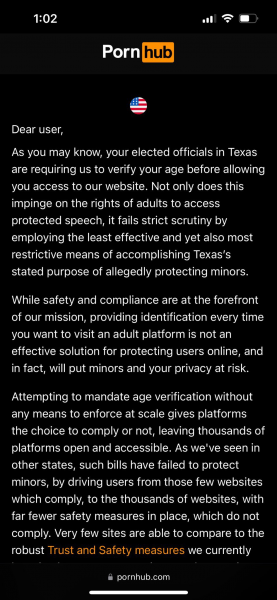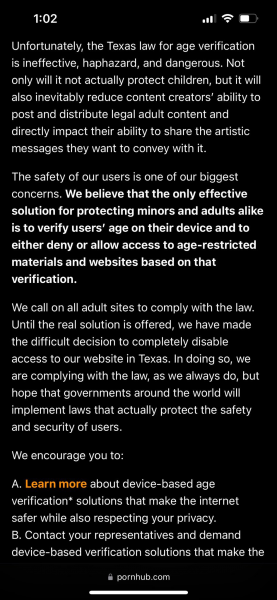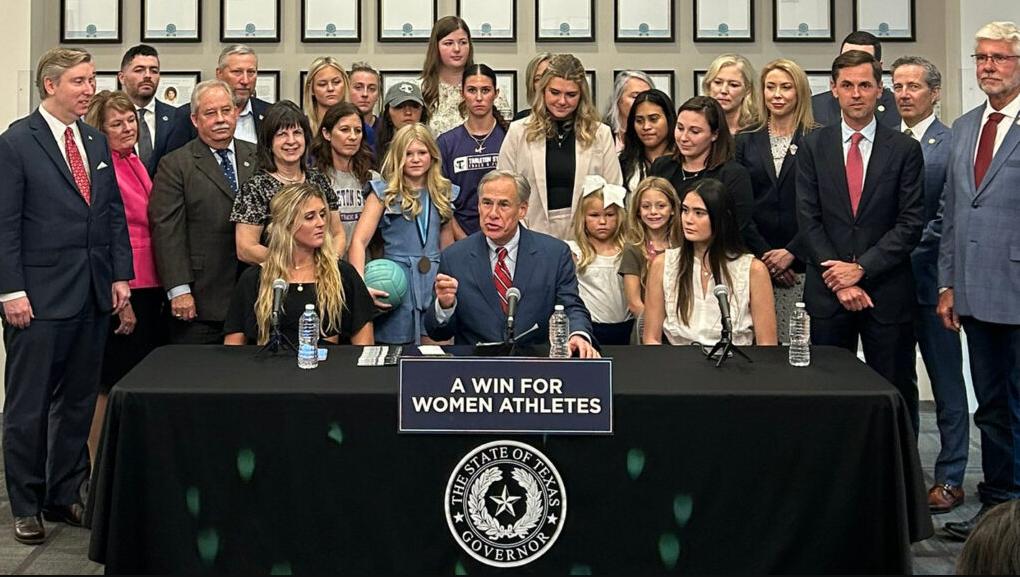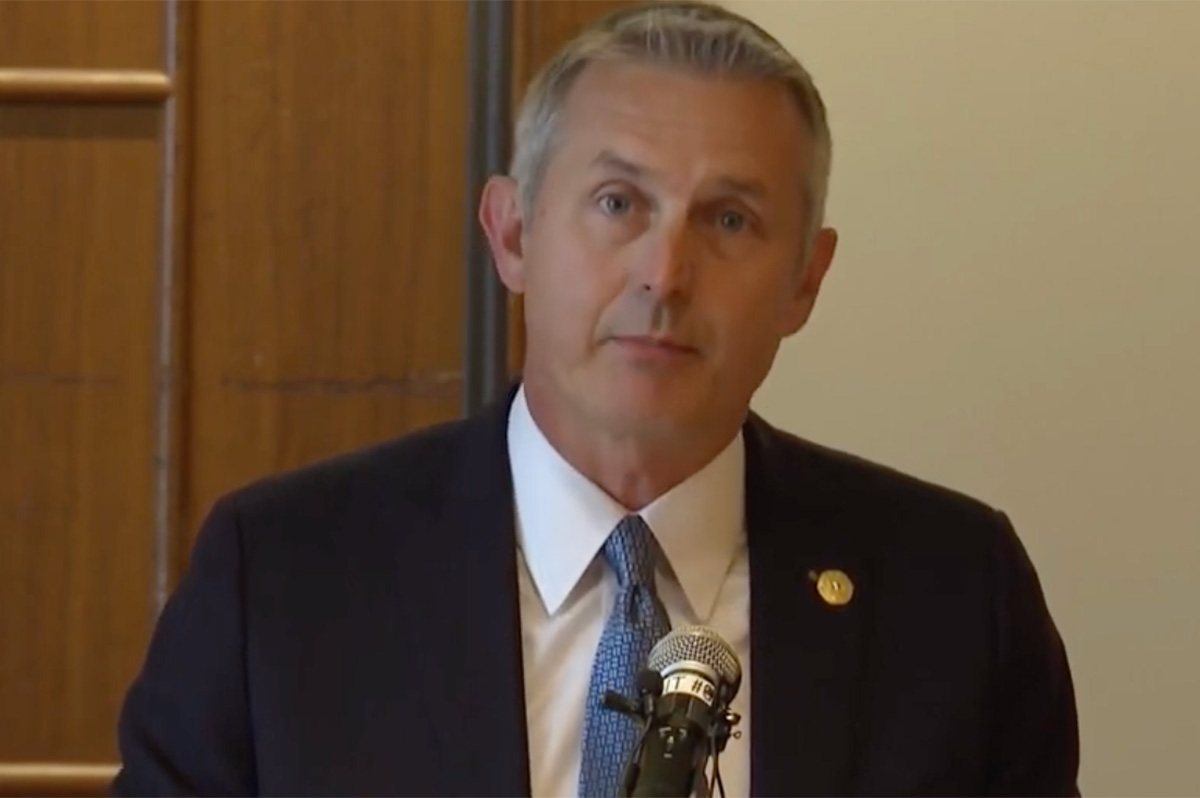Texas
Pornhub blocks Texas accessing site over age verification law
Court battle forced statute to take effect

Aylo (formerly MindGeek) the largest global adult online entertainment conglomerate, owned by Canadian private equity firm Ethical Capital Partners, has restricted access to its platforms including its flagship Pornhub in Texas after a court battle forces the state’s age verification law to take effect.
Texas Republican Attorney General Ken Paxton had appealed a U.S. District Court decision that enjoined him from enforcing House Bill 1181. Paxton and others argued that purveyors of obscene materials online needed to institute reasonable age-verification measures to safeguard children from pornography.
A week ago the 5th U.S. Circuit Court of Appeals partially vacated the original injunction, ruling that the age verification requirements are constitutional.
“Applying rational-basis review, the age-verification requirement is rationally related to the government’s legitimate interest in preventing minors’ access to pornography,” the three judge panel of the 5th Circuit explained. “Therefore, the age-verification requirement does not violate the First Amendment.”
While the court vacated the injunction against the age-verification requirement of the statute, it upheld the lower court’s injunction against a separate section of the law that would require pornography websites to display a health warning on their landing page and all advertisements.

The Houston Chronicle reported people who go to the site are now greeted with a long message from the company railing against the legal change as “ineffective, haphazard, and dangerous.” The company calls for age verification by the makers of devices that let people on the internet, instead of individual websites.
Age verification legislation was enacted in several states in 2023 in addition to Texas, including North Carolina, Montana, Arkansas, Louisiana, Mississippi, Utah and Virginia.
The new laws require users to provide digital confirmation via a certified approved third party vendor like London-based digital identity company Yoti. The other possibility would be a state approved digital ID such as the California DMV’s Wallet app, which contains a mobile driver’s license.
Users accessing Pornhub from within Louisiana are presented with a different webpage that directs them to verify their age with the state’s digital ID system, known as LA Wallet. The law passed in 2022 subjects adult websites to damage lawsuits and state civil penalties as high as $5,000 a day if they fail to verify that users are at least 18 years old by requiring the use of digitized, state-issued driver’s licenses or other methods.
The Associated Press reported this past October that an adult entertainment group’s lawsuit against a Louisiana law requiring sexually explicit websites to verify the ages of their viewers was dismissed by U.S. District Judge Susie Morgan in New Orleans.

Potential or existing Pornhub users in North Carolina and Montana are directed to a video that features adult film star Cherie DeVille, who recites a message also written under the video.
“As you may know, your elected officials in your state are requiring us to verify your age before allowing you access to our website. While safety and compliance are at the forefront of our mission, giving your ID card every time you want to visit an adult platform is not the most effective solution for protecting our users and in fact, will put children and your privacy at risk.”
“Mandating age verification without proper enforcement gives platforms the opportunity to choose whether or not to comply,” the statement continues. “As we’ve seen in other states, this just drives traffic to sites with far fewer safety measures in place.”
“Until a real solution is offered, we have made the difficult decision to completely disable access to our website in [the aforementioned locales]” the message ends with.
The company previously blocked Utah on May 7, 2023. CNN reported at the time:
Affected users are shown a message expressing opposition to Senate Bill 287, the Utah law signed by Gov. Spencer Cox in March that creates liability for porn sites that make their content available to people below the age of 18.
“As you may know, your elected officials in Utah are requiring us to verify your age before allowing you access to our website,” the message said. “While safety and compliance are at the forefront of our mission, giving your ID card every time you want to visit an adult platform is not the most effective solution for protecting our users, and in fact, will put children and your privacy at risk.”
Courthouse News reported that after Virginia’s bill was passed in June, state Sen. L. Louise Lucas, a Democrat, criticized the state for not creating a system for age verification, and instead leaving it up to websites to manage the process, citing security risks.
“We passed a bill during this session to protect children from online porn. However the executive branch had an obligation to create a system for age verification,” Lucas said on X, formerly Twitter. “We will continue our work to keep pornography out of the hands of minors … but we will also work to ensure that this Governor’s error does not put the privacy of Virginians at further risk.”
Beyond the U.S. in the European Union, Pornhub and two more of the world’s biggest porn websites face new requirements in the European Union that include verifying the ages of users, under the EU’s Digital Services Act.
According to a December 20 report from the Associated Press, Pornhub, XVideos and Stripchat have now been classed as “very large online platforms” subject to more stringent controls under the Digital Services Act because they each have 45 million average monthly users, according to the European Commission, the EU’s executive branch.
They are the first porn sites to be targeted by the sweeping Digital Services Act, which imposes tough obligations to keep users safe from illegal content and dodgy products, the Associated Press reported last month.
In addition to the adult entertainment websites, any violations are punishable by fines of up to 6% of global revenue or even a ban on operating in the EU. Some 19 online platforms and search engines have already been identified for stricter scrutiny under the DSA, including TikTok, Amazon, Facebook, Instagram, Google and more.
Texas
Texas Supreme Court rules judges can refuse to marry same-sex couples
Decision published on Oct. 24.

Texas judges will now be permitted to refuse to officiate same-sex weddings based on their “sincerely held religious beliefs,” following a ruling issued Oct. 24 by the Texas Supreme Court.
The state’s highest court — composed entirely of Republican justices — determined that justices of the peace who decline to marry LGBTQ couples are not violating judicial impartiality rules and therefore cannot be sanctioned for doing so.
In its decision, the court approved an official comment to the Texas Code of Judicial Conduct clarifying that judges may opt out of performing weddings that conflict with their personal religious convictions. This clarification appears to directly conflict with existing provisions that prohibit judges from showing bias or prejudice toward individuals based on characteristics such as race, religion, or sexual orientation.
“It is not a violation of these canons for a judge to publicly refrain from performing a wedding ceremony based upon a sincerely held religious belief,” the court’s comment states.
The original code explicitly bars judges from showing favoritism or discrimination, declaring that they must not “manifest bias or prejudice, including but not limited to bias or prejudice based upon race, sex, religion, national origin, disability, age, sexual orientation, or socioeconomic status.”
The case traces back to McLennan County Justice of the Peace Dianne Hensley, who was publicly reprimanded in 2019 after refusing to marry same-sex couples while continuing to perform ceremonies for heterosexual ones, the Texan reported.
The State Commission on Judicial Conduct found that her actions cast doubt on her ability to act impartially, but Hensley has spent the past six years challenging that reprimand in court, arguing that she was punished for adhering to her Christian beliefs.
In a statement responding to the Oct. 24 ruling, Texas House LGBTQ Caucus Chair Jessica González expressed disappointment with the decision.
“The Texas House LGBTQ Caucus is disappointed, but not surprised, to learn that the Texas Supreme Court is not willing to stand up for the rights of LGBTQIA+ Texans,” she said. “Our right to marriage should never depend on someone else’s religious beliefs. This change in the Judicial Conduct Code will only further erode civil rights in Texas.”
The Texas Supreme Court is also currently reviewing a related matter referred by the 5th U.S. Court of Appeals. That case involves another judge, Keith Umphress, who similarly refused to perform same-sex weddings for religious reasons. The 5th Circuit has asked the Texas justices to clarify whether the state’s judicial conduct code actually forbids judges from publicly declining to officiate same-sex weddings while continuing to perform ceremonies for straight couples — a question that could further define the boundaries between religious liberty and judicial impartiality in Texas.
Texas
Democrats block anti-trans legislation by breaking quorum in Texas
Lawmakers flee state to halt GOP-backed redistricting and anti-trans policies

As Texas House Democrats fled the state to prevent Republicans from gerrymandering Democratic-held districts to flip seats, they also blocked anti-transgender legislation from being considered simply by not showing up.
More than 50 House Democrats left Texas on Sunday in an attempt to pause—if not kill—recent Republican-proposed and Trump-encouraged measures making their way through the state House.
This move by Democrats is called “breaking quorum,” and means the Texas House has fewer than the required minimum number of representatives present to conduct business. In total, the Texas House has 150 seats. Republicans hold only 88 seats—less than the 100 required to meet quorum—pausing the legislative session.
The Democratic legislators traveled to Illinois and New York, two Democratic strongholds with outspoken governors vowing to protect them and prevent Republicans from gaining an unfair advantage in the middle of the legislative calendar—at Trump’s behest.
The major issue Texas Democrats are drawing attention to is the recent redistricting plan, which would flip five Democratic U.S. House of Representatives seats to Republican ones through the use of gerrymandering, or strategic manipulation of district boundaries. This gerrymandering would likely result in Republicans retaining control of the U.S. House in the 2026 midterms.
In addition to redistricting, Republicans have proposed Senate Bill 7 (SB7), also known as “The Trans Bathroom Ban.” This bill mandates that people use the bathroom in government buildings, schools, and women’s violence shelters that corresponds with their sex at birth, rather than their gender identity. The bill would also require incarcerated individuals to be placed in facilities that match their sex at birth.
Proponents of the bill, like Fran Rhodes, the president of True Texas Project—a hardline conservative group that opposes LGBTQ rights and immigration—argue that without SB7, “we put women and girls at risk.”
This proposed legislation has been denounced by Equality Texas, which says it would not only put trans women at risk, but also cis women, who would be subject to “invasive gender inspections.” They argue this would undermine the Republicans’ stated intent of the bill by subjecting women to unnecessary scrutiny rather than protecting them.
Multiple cis women have come out in opposition to the bill, including Wendy Davis, a lawyer and former member of the Texas State Senate, who called the bill “a solution without a problem.”
Davis continued, saying that “Our trans sisters deserve to be safe in the restroom, just like we deserve to be safe in the restroom.”
Additionally, some Black Texans have sounded the alarm on this bill, likening it to Jim Crow-era segregation legislation—but instead of skin color, it uses gender identity to discriminate.
As the clock runs out on this 30-day special session ending Aug. 19, there is a chance Republican Gov. Greg Abbott could extend the session, as it is within his power as governor.
Texas Democrats hope this will pressure Republicans to work with them to reach a compromise on both redistricting and killing the anti-trans bill.
Texas
Texas lawmaker introduces bill to criminalize identifying as transgender
Republican’s proposal unlikely to pass

Republican Texas state Rep. Tom Oliverson introduced a bill last week that would prohibit Texans from identifying themselves as transgender on official documents.
The legislation would classify as a state felony the act of “knowingly [making] a false or misleading verbal or written statement” by identifying one’s birth sex incorrectly to a governmental entity or to an employer.
While the bill, according to the Houston Chronicle, does not yet have any cosponsors and is considered unlikely to pass, the effort underscores conservative lawmakers’ turn toward increasingly extreme measures targeting the trans community, particularly in Texas.
For example, Republican state Rep. Brent Money introduced a bill last month that would have expanded the 2023 law barring gender affirming health treatments for minors by also prohibiting providers from offering puberty-suppressing medication, hormone therapy or surgeries to adults if the purpose is to affirm their gender identity.
Equality Texas reports that the state legislature has seen more than 170 bills targeting the LGBTQ community so far this year.
Oliverson in 2024 unsuccessfully challenged the chamber’s Republican speaker, Dade Phelan.




















